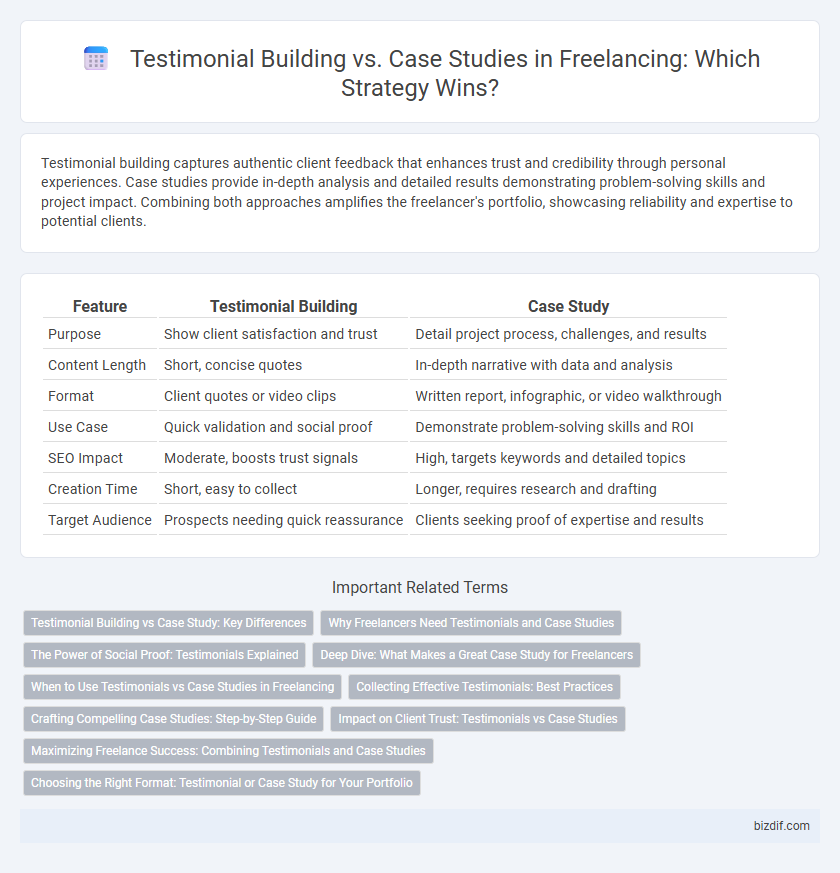Testimonial building captures authentic client feedback that enhances trust and credibility through personal experiences. Case studies provide in-depth analysis and detailed results demonstrating problem-solving skills and project impact. Combining both approaches amplifies the freelancer's portfolio, showcasing reliability and expertise to potential clients.
Table of Comparison
| Feature | Testimonial Building | Case Study |
|---|---|---|
| Purpose | Show client satisfaction and trust | Detail project process, challenges, and results |
| Content Length | Short, concise quotes | In-depth narrative with data and analysis |
| Format | Client quotes or video clips | Written report, infographic, or video walkthrough |
| Use Case | Quick validation and social proof | Demonstrate problem-solving skills and ROI |
| SEO Impact | Moderate, boosts trust signals | High, targets keywords and detailed topics |
| Creation Time | Short, easy to collect | Longer, requires research and drafting |
| Target Audience | Prospects needing quick reassurance | Clients seeking proof of expertise and results |
Testimonial Building vs Case Study: Key Differences
Testimonial building involves collecting short, positive statements from clients that highlight specific experiences or satisfaction with a freelancer's services, offering quick social proof to potential customers. Case studies provide detailed narratives that showcase how a freelancer solved a particular problem or achieved specific results, supported by data and in-depth analysis. While testimonials boost credibility with concise endorsements, case studies demonstrate expertise and problem-solving skills through comprehensive storytelling.
Why Freelancers Need Testimonials and Case Studies
Freelancers need testimonials to build trust and credibility by showcasing real client experiences and feedback. Case studies provide detailed insights into problem-solving skills and project outcomes, demonstrating the freelancer's ability to deliver results. Together, testimonials and case studies strengthen a freelancer's online reputation and attract potential clients through proven success stories.
The Power of Social Proof: Testimonials Explained
Testimonials leverage authentic client experiences to build trust and credibility, serving as powerful social proof that influences potential clients' decisions. Unlike case studies, which provide detailed narratives and data-backed outcomes, testimonials offer concise, relatable endorsements that resonate emotionally. Incorporating varied, specific testimonials enhances a freelancer's reputation by showcasing proven satisfaction and consistent results across diverse projects.
Deep Dive: What Makes a Great Case Study for Freelancers
A great case study for freelancers deeply analyzes specific client projects by showcasing measurable results, challenges faced, and tailored solutions that highlight individual skills. It provides detailed context, clear objectives, and quantifiable outcomes, making it easier for potential clients to understand the freelancer's impact and expertise. Unlike testimonial building, which offers brief positive endorsements, case studies deliver comprehensive narratives that demonstrate problem-solving abilities and real-world effectiveness.
When to Use Testimonials vs Case Studies in Freelancing
Testimonials work best for quickly establishing trust and social proof by showcasing client satisfaction in freelancing portfolios. Case studies provide detailed insights into problem-solving skills and project outcomes, ideal for demonstrating expertise to potential clients seeking comprehensive results. Use testimonials to highlight positive client experiences early in the sales funnel, and deploy case studies when prospects need in-depth evidence of your abilities and process.
Collecting Effective Testimonials: Best Practices
Collecting effective testimonials involves selecting authentic client feedback that highlights specific results and measurable benefits, enhancing credibility and trust for your freelancing services. Best practices include requesting detailed responses soon after project completion, using open-ended questions to capture impactful stories, and obtaining permission to showcase testimonials prominently. Incorporating multimedia formats like video or audio testimonials further increases engagement and showcases genuine client satisfaction.
Crafting Compelling Case Studies: Step-by-Step Guide
Crafting compelling case studies involves detailing a client's challenge, the strategic approach taken, and measurable outcomes to demonstrate value effectively. Highlight specific metrics such as increased revenue, time saved, or growth percentages to build credibility and attract new clients. Incorporate direct quotes and real results to differentiate case studies from testimonials, offering a narrative that showcases problem-solving skills and project impact in freelancing portfolios.
Impact on Client Trust: Testimonials vs Case Studies
Testimonials provide authentic, personal endorsements that boost client trust through relatable experiences and emotional connections. Case studies deliver detailed, data-driven insights showcasing real-world problem-solving abilities and measurable outcomes, enhancing credibility. Combining testimonials with case studies creates a powerful trust-building strategy by blending emotional appeal and factual evidence.
Maximizing Freelance Success: Combining Testimonials and Case Studies
Combining testimonials and case studies maximizes freelance success by showcasing both client satisfaction and detailed project outcomes, enhancing credibility and attracting potential clients. Testimonials provide quick, trustworthy social proof, while case studies demonstrate problem-solving skills and measurable results. Leveraging both tools creates a powerful portfolio that drives client confidence and increases project acquisition.
Choosing the Right Format: Testimonial or Case Study for Your Portfolio
Selecting the right format between testimonials and case studies hinges on your freelancing goals and target audience. Testimonials provide concise, authentic client feedback that builds trust and credibility quickly, ideal for showcasing positive experiences. Case studies offer a detailed narrative of problem-solving and project outcomes, demonstrating expertise and the value delivered through your services.
Testimonial Building vs Case Study Infographic

 bizdif.com
bizdif.com